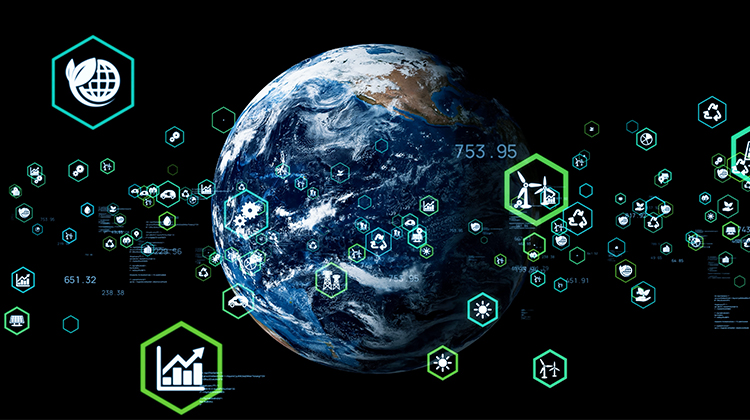May 2023
AI 2.0: Japan Opens Up the Tomorrow of Solving Social Issues
February 2024

AI Meets the Needs of Society
With the explosion of interest in how artificial intelligence (AI) can be harnessed to meet the needs of society, the public and private sectors are coming together in Japan to create solutions and products that combine the country's long history of pre-eminence in robotics with AI learning. Industry experts and policymakers agree that such innovations will be an important aspect of the Japanese economy in the future, as a declining workforce creates the need for higher productivity in such important areas as high-tech manufacturing and healthcare.
The Transformation of AI
AI research, which has been going on since the 1950s, is now experiencing its third boom, with the advent of big data, deep learning and generative AI in models such as ChatGPT. Digital transformation (known as DX in Japan) has revolutionized the creation of content such as documents, source code, images and audio in the information and service fields as well as the way companies in virtually every industry handle their data. We have already seen glimpses of DX in the medical and retail sectors, but it is predicted that we will enter a period of transformation with the fusion of the real world and AI.
Issues to Be Solved by the Use of AI in Japan
Japan is a leader in exploring the use of AI to respond to labor shortages and growing nursing care needs due to the declining birthrate and aging population. The number of people aged 65 and over in Japan has increased from less than 5% of the population in 1950 to over 28% in 2019. All of this will vastly increase the need for medical facilities with fewer people. More broadly, the range of applicable sectors includes disaster response, agriculture, medical care, and communication, as well as fields such as materials science and cultural activities.

Kachaka Home by Preferred Robotics
Japanese AI at Work
One of the participants in this area is the fast-growing "made in Japan" startup Preferred Networks. The company, founded in 2014, focuses on research and development for deep learning. Its robotics spinoff, Preferred Robotics showcased its Kachaka autonomous mobile robot at the January 2024 CES trade show in Las Vegas, in order to show Japanese innovation to the world. Equipped with AI and powered by the technologies of global leader Qualcomm, Kachaka delivers a mobile storage unit upon verbal request to make life at home more comfortable and relaxing. The company sees the robot as the first of many that can eliminate daily small chores at home.
"I think that through LLM (large language models), we are now witnessing a breakthrough moment for robotics. With investments into improving what robots can do, there will be a great impact on robot technology. We are now focusing on collaboration of LLM and robots, this is the most important theme for us," said Toru Isobe, CEO of Preferred Robotics, who brings experience in the field from long experience as an engineer at Toyota and Mitsubishi Heavy Industries.

Toru Isobe, CEO of Preferred Robotics
In the area of critical medical care, such as for cancer treatment, AI can analyze large sets of clinical and genomic data to help physicians prescribe the best plan of treatment for each patient, going far beyond traditional methods. Japan is actively obtaining this data and is looking at technology, especially from overseas, to help bring in the interpretative magic of AI, according to Geoffrey Hasemer, proprietor of the Tokyo-based consulting firm GHMS, with more than 20 years of experience in helping foreign healthcare firms in Japan. "In addition to facilitating treatment recommendations, AI, in combination with large, up-to-date, comprehensive databases, can be used to greatly improve clinical trials, benefiting the entire healthcare system," he said.
Underlining the importance of these developments, the Japanese government made AI an important area of discussion at the May 2023 summit as president of the G7. The result was the Hiroshima AI Process. Under the AI Strategy Council, Japan has been working to promote AI, while ensuring that it is used properly and has the appropriate rules to enable cross-border interoperability.
Foreign Investors Participate in the AI Systems Market
The Japan AI systems market is already large and is growing fast. The trade group IDC Japan estimates that compound annual growth rate (CAGR) between 2022 through 2027 will average 23%, reaching a total of more than one trillion yen. In addition to solving social issues, it will create new jobs such as software development and contribute to the growth of Japan.
It has also caught the attention of large international firms such as venture capital firm Lux Capital, which says it is "bullish" on Japan with a lead role in a January 2024 investment of 30 million dollars in Sakana AI, a Tokyo-based AI startup and research group that is attracting the attention of big corporates such as NTT Group, KDDI CVC and Sony Group. "In an increasingly complex world, Asia needs and will have an influential new AI trailblazer, and Japan, a powerful democratic nation and a great ally of the US, is poised to be that leader," said Josh Wolfe, Lux co-founder and managing partner.
Japan's AI Market Continues to Grow
It is clear that AI is quickly changing the world of tech and industry more broadly around the world. Domestic and foreign leaders in the industry are looking to the development of AI technology and the expansion of AI utilization in Japan. As part of our focus on attracting new technologies, we are happy to support foreign companies who want to participate in these exciting new developments. The opportunities are endless.
Learn More
Contact Us
Investing in and collaborating with Japan
We will do our very best to support your business expansion into and within Japan as well as business collaboration with Japanese companies. Please feel free to contact us via the form below for any inquiries.
Inquiry FormJETRO Worldwide
Our network covers over 50 countries worldwide. You can contact us at one of our local offices near you for consultation.
Worldwide Offices

































